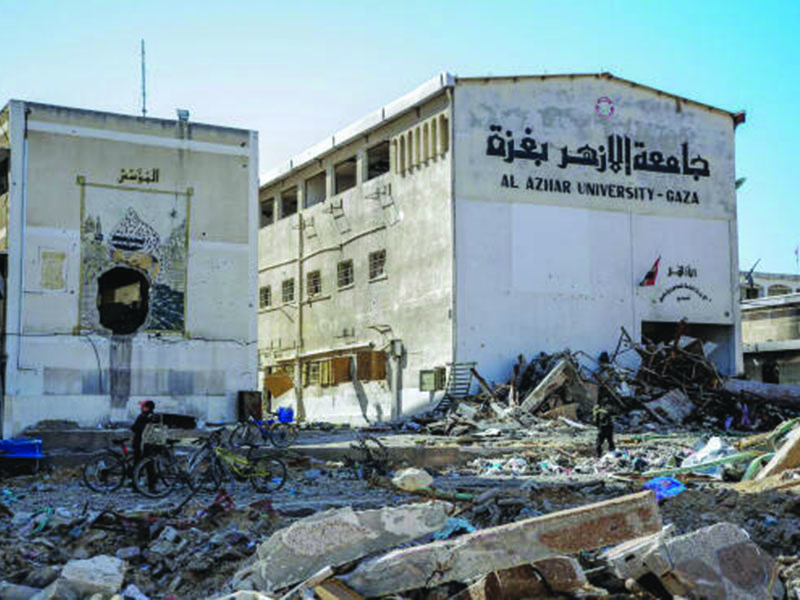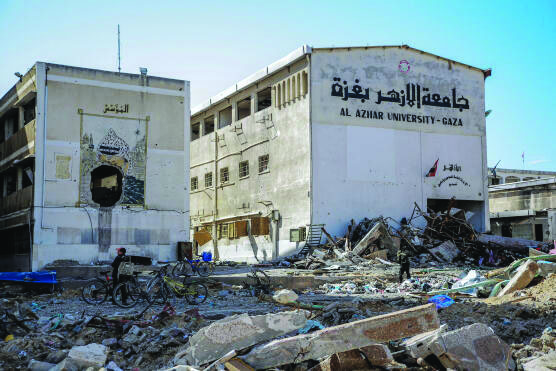Palestine/Gaza: Struggle against educide
Two hundred days into the invasion of Gaza by Israel, not a single university is left standing. At least 95 university professors and 5,000 students are reported to have been killed, while more than 500,000 children have been out of school for over seven months.
“Everything was beautiful before October 7,” laments Besan Emad, an English translation student at Gaza University trapped in Rafah, the southern city that, at the time of writing (May 22), was one of the last parts of the Gaza Strip outside the control of the Israeli military. “We could find everything easily. We had AI we could use. But today we have no internet, no resources and no university.”
In the short term, the focus for Palestinian civilians fleeing Israeli attacks is survival. “The situation in Rafah is very bad… Israeli occupation has destroyed everything — hospital, schools, universities,” says Emad.
Yet, even in the face of a strategy branded “educide” — an attempt to extinguish breeding grounds for intellectual thought and liberty of expression within Palestine, as part of the retaliation against Hamas’ October 7 attacks — efforts to preserve higher education in Gaza and the West Bank might offer an unlikely symbol of hope. Ms Emad is one of a growing number of Palestinian students attempting to continue their studies in the harshest of conditions through online learning, accessing tutoring offered by global scholars when she is able to get online.
Marah Shaqalaih is another Palestinian student accessing online courses, with hers offered by universities in the West Bank. The daughter of a former engineering lecturer at the Islamic University of Gaza, her own institution, Al-Azhar University of Gaza, was destroyed by the Israeli military. “We started (the academic year) and only two weeks in, the war began. I was with my patients and (was) talking to them, and now I do not know what happened to them,” she says.
The Israeli army claims that it found Hamas explosives and rocket parts at Al-Azhar, as well as part of a tunnel network. But the university, which was one of the biggest universities in the Gaza Strip with about 15,000 undergraduates, has no affiliation to Hamas, Ms Shaqalaih insists.
Most university professors in Gaza haven’t received their salary since November, with many institutions telling their staff to seek other jobs. Fabio Carbone, a senior lecturer in tourism management at the University of Northampton, who has been working to recruit academic tutors for university students from Gaza, says no international organisation would give money to universities in the strip because of their perceived ties to Hamas, “and the politics have nothing to do with academia any more… the victims in this are the students”, he says.
Beyond the destruction in Gaza, the situation in the West Bank has also worsened drastically since October 7. The number of checkpoints and searches by Israeli soldiers has increased significantly, and all the universities switched initially to online teaching in a bid to protect students.
Samia Al-Botmeh, an assistant professor of economics at Birzeit University in the West Bank, says that higher education had been “substantially” affected. “There were also heightened arrests of students and staff. We have more than 150 students, and five staff members in prison,” she says.
Most foreign scholars have fled. “Colleagues travelling internationally into Palestinian universities, either for joint research projects or conferences, or wanting to teach a term — it’s become impossible,” says Dr. Al-Botmeh.


















Add comment